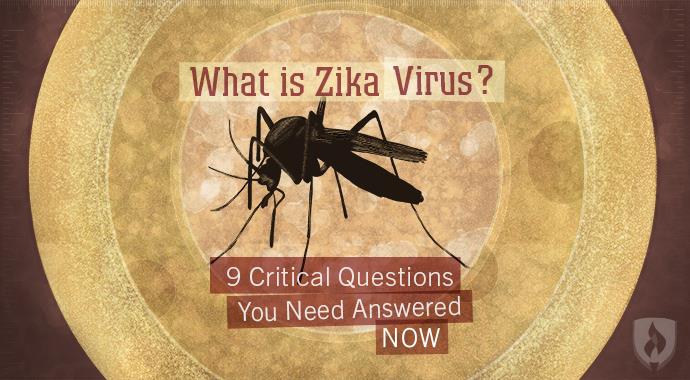What is Zika Virus? 9 Critical Questions You Need Answered NOW
By Kristina Ericksen on 02/29/2016

You’ve seen the chilling photos. You’ve heard the alarming reports. The Zika virus is spreading – coming soon to a mosquito near you. Or is it?
The World Health Organization (WHO) declared a global health emergency. The Center for Disease Control (CDC) issued a travel warning. Temperatures are warming and mosquitos are spreading. And with no cure in sight, concerns are growing.
With the Summer Olympics in Rio on the horizon, the world looks to South America and waits for a resolution.
But before you get too swept up in all of the hype, you still have some questions: What is Zika virus exactly? And as it encroaches closer to home, what does it mean for you?
We’re here to answer your most commonly asked questions. Here’s what you need to know about the Zika virus.
What is Zika virus, anyway?
The Zika virus is a disease spread from mosquito bites. It can also be spread sexually or through blood transfusions.
Its symptoms are usually mild and the illness is widely undiagnosed. However, Zika is believed to be linked to Guillain-Barré syndrome, an autoimmune disorder that can lead to paralysis and microcephaly in newborns.
You may be surprised to hear that Zika is not a new virus. It was first detected in 1947 in Uganda and only affected a handful of people in Africa and Southeast Asia until 2007, which saw a Zika outbreak in the Pacific Islands. Another outbreak struck French Polynesia in 2013.
The first case of Zika was confirmed in Brazil in 2015 and has since spread to 29 countries throughout North and South America.
What are the Zika virus symptoms?
Only one out of five people infected with Zika virus get sick, which is why diagnosis is so tricky. Once bitten by an infected mosquito, illness may begin within two to seven days.
Those affected may experience a fever, rash, joint pain or redness of eyes. The illness is usually mild. Very rarely do people with Zika get sick enough to be hospitalized or die.
How does the Zika virus spread?
Zika virus spreads from the bite of an infected Aedes species mosquito. Once bitten, the virus remains in the bloodstream for about a week. Individuals with the Zika virus can also infect mosquitos that bite them while ill. The Aedes species tends to bite during the morning and late afternoon hours.
The Zika virus can also be transmitted through blood transfusions and sexually. A pregnant woman infected with the Zika virus can also pass it along to her fetus.
What Zika virus treatment options are available?
There is currently no known cure for Zika virus infections. If you fall ill with Zika, the CDC recommends getting plenty of rest and fluids. Medicines like acetaminophen can be taken for fever or pain, but the CDC advises against taking aspirin or non-steroidal anti-inflammatory medications.
Additionally, if you contract a Zika virus infection, you should avoid more mosquito bites in the first week of your illness. The Zika virus in your bloodstream can be passed along and spread to other mosquitoes that are not yet infected.
What countries have Zika virus outbreaks?
The following are the countries deemed active with the Zika virus by the CDC:
| Barbados | French Guiana | Paraguay |
| Bolivia | Guadeloupe | Saint Martin |
| Brazil | Guyana | Suriname |
| Columbia | Haiti | U.S. Virgin Islands |
| Commonwealth of Puerto Rico | Honduras | Venezuela |
| Costa Rica | Jamaica | Oceania/Pacific Islands |
| Curacao | Martinique | American Samoa |
| Dominican Republic | Mexico | Samoa |
| Ecuador | Nicaragua | Tonga |
| El Salvador | Panama | Cape Verde |
How widespread is the Zika virus in the USA?
There have been less than 60 reported cases of Zika virus in the USA thus far. These cases have all been travel-related, meaning the virus was acquired while traveling or from contact with someone who had been in Zika-active country.
No local mosquito-born Zika virus cases have been detected yet in the USA, though the CDC predicts that stateside outbreaks will increase. As much as 60 percent of the US population lives in regions seasonally conducive to Zika, where it could spread as temperatures rise.
What effect does Zika virus have on babies?
Troubling birth defects are believed to result from Zika infection in pregnant women. As mentioned above, pregnant women infected with Zika virus can pass it along to their fetus. Microcephaly, a condition resulting in an underdeveloped brain and smaller-than-average head size in newborns, is believed to be linked to the Zika virus.
Microcephaly can occur in isolation or in addition to other birth defects, such as seizures, intellectual disability, developmental delay and hearing and vision problems. Microcephaly is a lifelong condition and cases range from mild to severe. There is no known cure, but associated health problems can be treated and intervened.
While the connections between Zika and microcephaly are widely believed, others think the surge in microcephaly isn’t from Zika, but actually from a toxic larvicide in Brazil’s water system. Researchers are working to verify either a Zika or larvicide connection in the meantime.
What does the Zika virus mean for pregnancies?
In light of the microcephaly surge, El Salvador proposed women wait to have children until 2018. Officials in Columbia, Jamaica, Panama and Ecuador also urged women to delay any pregnancies. Brazil has yet to declare an official statement, but one Brazilian pediatric infectologist recommended pregnancies be postponed if possible.
The CDC also issued travel precautions for pregnant women in Zika-active regions. They recommend pregnant women postpone travel to areas with Zika virus transmission. If waiting is not possible, pregnant women are urged to cover exposed skin, use insect repellent and stay in screened and air conditioned locations.
What’s next for the Zika virus?
With the summer Olympics set to begin in Rio in the coming months, all eyes turn to Brazil, a country at the center of the epidemic. With no cure in sight, little can be done to prevent the spread of the Zika virus during the event.
The Obama administration requested $1.8 million in emergency funding to help fight Zika. The European Union pledged $11 million to fund research. Some are proposing genetic modification to combat the spread of Zika in mosquitos.
As for a cure for infected humans, researchers are already underway. But even if a cure is discovered, clinical drug trials and approval could take years.
Now what?
With no known cure in sight, the world awaits as researchers delve into the root of the virus to resolve this global emergency. But for now, families postpone their pregnancies and travelers cancel their vacations.
In the meantime, all eyes turn to the residents of Zika-struck regions and the immense difficulties facing them as they move forward in this time of crisis.
For more information on the Zika virus and what you can do to protect yourself, consult the Center for Disease Control’s Zika virus page.
RELATED ARTICLES:




